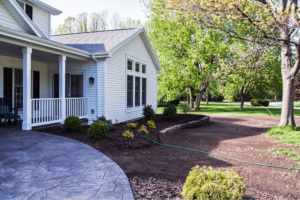When it comes to transforming your living space, the decision between embarking on a home renovation or building a new home from the ground up can be a tough one.
Both options are great but also have their drawbacks – and choosing the right path largely depends on your specific circumstances, needs, and goals.
At Ridgeline Improvements, we want to make sure you make the best decisions when it comes to your home. So, let’s take a look at the differences between home renovations and new builds and dig into the factors you should consider when making this important decision.
What’s the Difference Between Home Renovations and New Builds?
Before we get into the pros and cons of each option, let’s go over what distinguishes a home renovation from a new build:
Home Renovation
A home renovation involves making significant changes or improvements to an existing structure while retaining its original framework. This can include updating kitchens, bathrooms, adding new rooms, or giving the entire house a makeover.
And when it comes to home renovations, the possibilities are virtually endless! You can breathe new life into an older home by modernizing its features, enhancing its curb appeal, and improving its overall function.
It’s a sustainable choice that allows you to recycle existing materials and reduce construction waste.
Home renovations also come with the added benefits of preserving the unique character and history of your home, which can be especially appealing if you have a sentimental attachment to your property.
However, it’s important to note that a home renovation may require careful planning in order to work within the existing layout and structural constraints of your home.
New Build
A new build, on the other hand, involves the construction of an entirely new home from scratch, often on a vacant lot or as a tear-down and rebuild project.
When you choose to go for a new build, you are essentially starting with a blank canvas. This means you have the opportunity to design your dream home from the ground up, tailoring every aspect to your personal tastes and needs.
But, on the flip side, the upfront cost of building a new home tends to be quite high, and the construction process is more time-consuming.
You’ll also need to factor in the cost and logistics of temporary housing during the construction phase.
Factors to Consider in the Decision-Making Process
So when it comes to choosing between renovating your current home or embarking on the adventure of building a new one, there are several factors that come into play.
Each one plays a unique role in shaping your decision and needs to be carefully weighed.
These factors will ultimately guide you toward the path that aligns best with your goals and vision for your living space:
Budget
Home renovations can often be more cost-effective than building a new home since you can work within your existing budget and make improvements over time to avoid upfront costs.
This flexibility is advantageous for homeowners who want to enhance their living space without breaking the bank.
You can prioritize upgrades based on your financial situation, whether it’s updating the kitchen this year and tackling the bathroom next year.
Plus, renovation costs can often be partially offset by the increased value it adds to your home, making it a wise long-term investment.
Building a new home, on the other hand, typically requires a larger upfront investment.
But while this initial cost may seem daunting, there are some long-term benefits, such as customizing your home and utilizing more energy-efficient materials to lower utility costs.
New homes also tend to require fewer maintenance and repair expenses over time.
Timeframe
Home renovations can be completed faster than new builds, especially if they focus on specific areas of your home.
This speed can be a significant advantage when you’re eager to enjoy the improvements you’ve planned!
Since renovations often concentrate on one part of your house at a time, you can maintain a level of comfort and routine in the unaffected areas.
Constructing a home from scratch takes more time due to the planning, permitting, and construction phases.
Keep in mind that this extended timeline might require you to find temporary housing, which should be factored into your overall budget and plans.
However, the anticipation of a brand-new, customized living space may just be worth the wait.
Customization

While you can personalize your space with a home renovation, you may be limited by the existing layout and structural elements.
This limitation can be both a challenge and an opportunity!
You’ll need to work within the confines of your current floor plan, which may require creative solutions to achieve your desired result.
But renovating an existing space can also celebrate its unique character and history, preserving elements that have sentimental value or architectural significance.
A new build offers customization options from the layout of individual rooms to the choice of materials, finishes, and fixtures.
This level of customization ensures that your new home aligns perfectly with your lifestyle and preferences. It’s a chance to create a space that functions just as you want it to.
Condition of Existing Property
The condition of your current home plays a significant role in determining whether a home renovation is a viable option.
If your home’s foundation and structural elements are sound, renovation can definitely be an attractive choice and can address cosmetic issues, modernize outdated features, and improve functionality.
But if your home has extensive structural issues or a deteriorating foundation, you may want to consider a new build since attempting to renovate in such cases can be risky.
Starting from scratch eliminates the concerns about the existing structure’s condition and potential hidden problems. It may also eliminate the need for costly repairs or retrofits that might be necessary with an older home.
Pros and Cons of Home Renovation
Now that you know what you should keep in mind when making this decision, let’s explore the pros and cons of choosing to renovate your existing home:
Pros
- Cost-Efficient: Renovations are often more budget-friendly than building new.
- Preservation: Retain the character and history of your existing home.
- Quick Turnaround: Renovations can be completed faster than new builds.
Cons
- Limitations: Structural constraints can limit design options.
- Hidden Costs: Unforeseen issues may arise during renovations, leading to extra expenses.
- Disruptions: Living in a construction zone can be disruptive and inconvenient.
Pros and Cons of New Build
In the pursuit of a dream home, the option of building new comes with its own set of advantages and disadvantages:
Pros:
- Customization: Design your dream home from the ground up.
- Energy Efficiency: Incorporate modern, energy-efficient features.
- Long-Term Savings: New builds often require less maintenance.
Cons:
- Higher Initial Cost: Building a new home can be more expensive.
- Extended Timeline: Construction can take longer than a renovation.
- Temporary Housing: You may need to find temporary accommodation during the building process.
Making the Right Choice for Your Home
Choosing between home renovation and building a new home is a significant decision that hinges on numerous factors.
At Ridgeline Improvements, we understand that this decision can be complex, and we’re here to help you every step of the way.
Our team of experts specializes in home additions and full home renovations, and we’re dedicated to transforming your living space into the home of your dreams.
To explore your options further, receive personalized guidance, and take the first steps toward enhancing your home, don’t hesitate to contact Ridgeline Improvements today.





